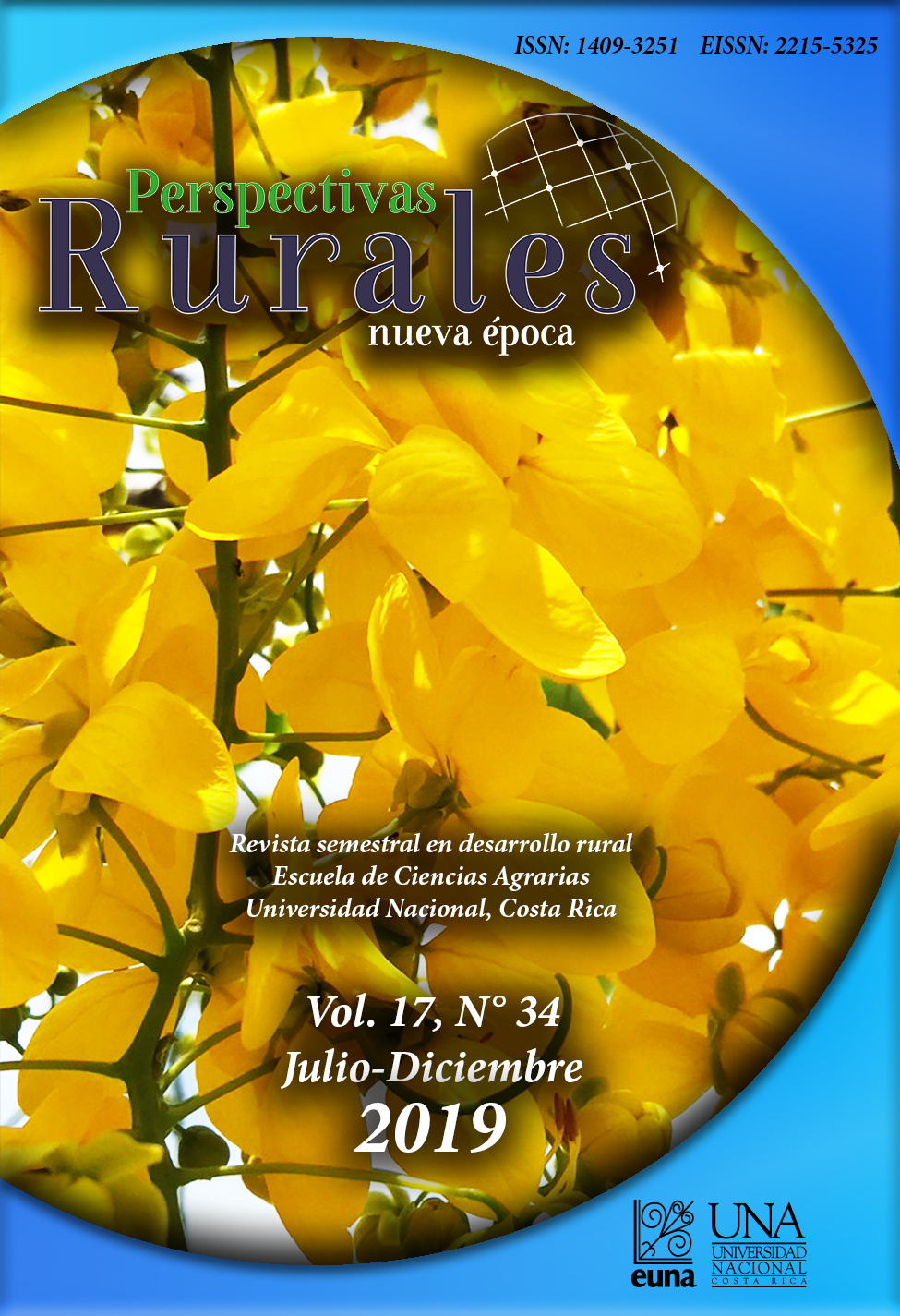Territorial development strategies: encouraging origin products through public policies and social participation
DOI:
https://doi.org/10.15359/prne.17-34.1Keywords:
multifunctional virtuous circle of quality, global value chains, global production networksAbstract
This article presents a theoretical approach on the importance of territorial development policies to promote origin products, acknowledging they can, in turn, be an instrument to enhance development. If an origin product promotes the economic development of the territory, it benefits the population through employment, which, in turn, improves people’s wellness or quality of life. At the same time, socio-cultural characteristics encourage development of an origin product, since they give products identity. Consequently, a qualitative methodology is used to identify various approaches, such as heritage and products of quality linked to geographical origin, multifunctional virtuous circle of quality, global value chains, and global production networks. In addition, the importance of these policies in the interaction between institutions and social participation is analyzed.
References
Alvarado, I. y López, A. (2018). Turismo, patrimonio y representaciones espaciales. México: Colección PASOS Edita, no. 22.
Barham, E. y Sylvander, B. (eds.). (2011). Labels of origin for food: local development, global recognition. Reino Unido: Claire Parfitt and Rachel Cutts.
Barjolle, D. (2006). GIs and PDOs: An intellectual property tool useful for rural development objectives? ALTERO6-SYAL Seminar, Baeza, España.
Barjolle, D. y Thévenod-Mottet, E. (2004). Ancrage territorial des systèmes de production: le cas des appellations d’origine contrôlée. Industries Alimentaires et Agricoles, 6, pp. 19-27.
Barjolle, D., Sylvander, B. y Thévenod-Mottet, E. (2011). Public Policies and Geographical Indications. En E. Barham y B. Sylvander (eds.), Labels of origin for food: local development, global recognition (pp. 92-105). Reino Unido: Claire Parfitt and Rachel Cutts.
Barjolle, D. y Vandecandelaere, E. (2012). Identification of origin- linked products and their potential for development: a methodology for participatory inventories. Roma: Food and Agriculture Organization of the United Nations (FAO).
Belletti, G., Brunori, G., Marescotti, A. y Rossi, A. (2003). Multifunctionality and rural development: a multilevel approach. En G. Van Huylenbroeck y G. Durand (eds.), Multifunctional Agriculture: A New Paradigm for European Agriculture and Rural Development? (pp. 54-82). Aldershot, Reino Unido: Ashgate.
Belletti, G. y Marescotti, A. (eds.). (2008). Geographical indications strategies and policy recommendations. Projet SINER-GI, Toulouse.
Belletti, G., Marescotti, A., Paus, M. y Hauwuy, A. (2008). Evaluation des effets locaux des AOP-IGP: développement rural, organisations sociales et vie des territoires. En B. Sylvander, F. Casablanca, y F. Roncin (eds.), Proceedings of the international symposium organized by INRA (Institut National de la Recherche Agronomique) and INAO (Institut Nationale de l’Origine et de la Qualité) ‘Actes du Colloque International de Restitution des Travaux de Recherche sur les Indications et Appellations d’Origine Géographiques: Produits Agricoles et Alimentaires d’Origine: Enjeux et Acquis Scientifi ques, 17-18 Novembre 2005, Paris’ (pp. 214-228). París: INRA Editions.
Belletti, G. y Marescotti, A. (2011). Origin Products, Geographical Indications and Rural Development. En E. Barham y B. Sylvander (eds.), Labels of origin for food: local development, global recognition (pp. 75-91). Reino Unido: Claire Parfitt and Rachel Cutts.
Boisseaux, S. (2002). Type de Produit, Type de Développement Rural: Est-il Possible d’Établir un Lien? Barcelona: Concerted Action DOLPHINS.
Bueno, C. y Aguilar, E. (coords.). (2005). Las Expresiones Locales de la Globalización: México y España. México: Ciesas, Universidad Iberoamericana, Porrúa.
Burch, D. y Lawrence, G. (eds.). (2007). Supermarkets and Agri-food Supply Chains: Transformations in the Production and Consumption of Foods. Reino Unido: Cheltenham.
Carámbula, M. y Ávila, L. (coords.). (2013). Patrimonio biocultural, territorio y sociedades afroindoamericanas en movimiento. Buenos Aires: CLACSO.
Coe, N., Hess, M., Yeung, H., Dicken, P. y Henderson, J. (2004). Globalizing Regional Development: A Global Production Networks Perspective.
De la Calle, L. (2002). “Denominaciones de origen y protección económica”, Estudios Agrosociales y Pesqueros, 194, España, pp. 27-48.
Delgadillo, J. y Torres, F. (2009). Hacia una política territorial del desarrollo rural de México. Convergencia, 16(50), 107-131.
Dupré, L. (2005). Heritage production: between naturalization and excessive historicity. En L. Bérard, M. Cegarra, M. Djama, S. Louafi, P. Marchenay, B. Roussel y F. Verdeaux (eds.). (2005). Biodiversity and Local Ecological Knowledge in France (pp. 197-204). París: INRA/CIRAD/IDDRI/IFB.
Echavarría, J. (2016). Debates y redefiniciones del patrimonio cultural. Ciencias Sociales y Educación, 5(9), pp. 109-126.
Echeverri, R. y Ribero, M. (2002). Nueva ruralidad. Visión del territorio en América Latina y el Caribe. Bogotá: IICA, CIDER, Corporación Latinoamericana Misión Rural.
Eguillor, P. (2014). Indicaciones geográficas: una herramienta de diferenciación. Chile: Oficina de Estudios y Políticas Agrarias (ODEPA).
Elms, D. y Low, P. (eds.). (2013). Global value chains in a changing world. Suiza: WTO Publications, Fung Global Institute, Nanyang Technological University (NTU), and World Trade Organization (WTO).
Espinosa, N. (2010). Elementos para una política protectora de las Denominaciones de Origen en Colombia. Revista Cultura Científica, 0(8), 24-33.
Farinós, J. (2008). Gobernanza territorial para el desarrollo sostenible: estado de la cuestión y agenda. Boletín de la A.G.E., (46), 11-32.
Fernández, R. (2018). Patrimonio e identidad (1). A modo de introducción. Diario de Navarra. Recuperado de https://www.unav.edu/web/facultad-de-medicina/detalle-opinion2/18/09/28/patrimonio-e-identidad-(1)-a-modo-de-introduccion?articleId=19374144
Flores, M. (2007). La identidad cultural del territorio como base de una estrategia de desarrollo sostenible. Revista Opera, (7), 35-54.
Fonte, M. y Ranaboldo, C. (2007). Desarrollo rural, territorios e identidades culturales. Perspectivas desde América Latina y la Unión Europea. Revista Opera, (7), 9-31.
FAO (Food and Agriculture Organization of the United Nations). (2018). Programa Calidad&Origen. Recuperado de http://www.fao.org/in-action/quality-and-origin-program/es/
Gereffi, G. (1994). The Organization of Buyer-driven Global Commodity Chains: How US Retailers Shape Overseas Production Networks. En G. Gereffi y M. Korzeniewicz (eds.), Commodity Chains and Global Capitalism (pp. 95-122). Londres: Praeger.
Gereffi, G., Korzeniewicz, M. y Korzeniewicz, R. (1994). Introduction: Global Commodities Chains. En G. Gereffi y M. Korzeniewicz (eds.), Commodity Chains and Global Capitalism (pp. 1-14). Londres: Praeger.
Gereffi, G., Humpmphrey, J., Kapaplinsky, R. y Sturgeon, T. (2001). Introduction: globalisation, value chains and development. Boletín del IDS, 32(3), 1-8.
Gereffi, G., Humphrey, J. y Sturgeon, T. (2005). The Governance of Global Value Chains. Review of International Political Economy, 12(1), 78-104.
Gibbon, P. y Ponte, S. (2005). Trading Down: Africa, Value Chains and the Global Economy. Philadelphia: Temple University Press Policy.
Giménez, G. (1994). Modernización, culturas e identidades en México. Revista Mexicana de Sociología, 56(4), 255-272.
Gómez-Sierra, F. (2004). Zonificación, terror y denominación de origen en el fortalecimiento de los campesinos viticultores del Valle del Sol en Boyacá. Revista Cultura Científica, 2(1), 14-25.
Gravari-Barbas, M. (2018). Tourism as a heritage producing machine. Tourism Managing Perspectives, 26, 5-8. Recuperado de https://doi.org/10.1016/j.tmp.2017.12.002
Hall, S. (1997). Representation: Cultural Representations and Signifying Practices. Londres: Sage.
Harvey, D. (1969). Explanation in Geography. EE. UU.: University of Michigan.
Henderson, J., Dicken, P., Hess, M., Coe, N. y Yeung, H. (2002). Global Production Networks and the Analysis of Economic Development. Review of International Political Economy, 9(3), 436-64.
Henriksen, L., Riisgaaaard, L., Ponte, S., Hartwich, F. y Kormamava, P. (2010). Agro-food value chain interventions in Asia: a review and analysis of case studies. [Documento de trabajo]. Viena: ONUDI.
Hopkins, T. y Wallerstein, I. (1977). Patterns of Development of the Modern World-System. Review, 1(2), 111-145.
Linck, T. (2007). Patrimoines sous tension. L’exclusion, condition et écueil de l’appropriation collectiveér Economie appliquée. París:
Linck, T. (2007). Patrimoines sous tension. L’exclusion, condition et écueil de
l’appropriation collective. Economie appliquée, 3, 177-198.
Linck, T., Barragan, E. y Navarro, H. (2014). Hacia una economía de la patrimonialización. Las apropiaciones colectivas de lo biótico y lo cognitivo. En H. González y M. Calleja (eds.), Dinámica territorial agroalimentaria en tiempos de glocalización (pp. 69-98). México: Universidad de Guadalajara.
Marcos, J. (2004). La tradición, el patrimonio y la identidad. Revista de estudios extremeños, 60(3), 925-956.
Morrison, A., Pietrobelli, C. y Rabellotti, R. (2008). Global value chains and technological capabilities: a framework to study learning and innovation in developing countries. Oxford Development Studies, 36(1), 39-58.
Pietrobelli, C. y Staritz, C. (2017). Cadenas globales de valor y políticas de desarrollo. Desarrollo Económico, 56(220), 371-391.
Pozas, M. Á. (2012). Redes globales de producción y sistemas nacionales de innovación: las teorías de alcance medio como articuladoras de la investigación empírica. Estudios Sociológicos de El Colegio de México, 30(extra), 269-289.
Raffestin, C. (1986). Ecogénese territoriale et terri-torialité. En F. Auriac y R. Brunet (eds.), Espaces, jeux et enjeux (pp.173-183). París: Fayard editions.
Ranaboldo, C. y Schejtman, A. (eds.) (2009). El valor del patrimonio cultural. Territorios rurales, experiencias y proyecciones latinoamericanas. Lima: IEP, RIMISP, Territorios con Identidad Cultural.
Riisgaard, L., Bolwig, S., Ponte, S., du Toit, A., Halberg, N. y Matose, F. (2010). Integrating Poverty and Environmental Concerns into Value-Chain Analysis: A Strategic Framework and Practical Guide. Development Policy Review, 28(2), 195-216.
Schejtman, A. y Berdegué, J. (2004). Desarrollo territorial rural. Chile: RIMISP-Centro Latinoamericano para el Desarrollo Rural.
Serrano, C. (2011). Gobernanza para el desarrollo económico territorial en América Latina. Chile: RIMISP-Centro Latinoamericano para el Desarrollo Rural.
Sturgeon, T. (2002). Modular production networks. A new American model of industrial organization. Industrial and Corporate Change, 11(3), 451-96.
Thévenod-Mottet, E. (2010). Indications and biodiversity. En S. Lockie y D. Carpenter (eds.), Agriculture, Biodiversity and Markets (pp. 201-212). Londres/Washington D. C.: Earthscan.
Thévenod-Mottet, E. y Delphine M. V. (2011). Legal Debates Surrounding Geographical Indications. En E. Barham y B. Sylvander (eds.), Labels of origin for food: local development, global recognition (pp.13-28). Reino Unido: Claire Parfitt and Rachel Cutts.
Torres, F. y Delgadillo, J. (2009). Hacia una política territorial del desarrollo rural de México. Convergencia, 16(50), 107-131.
Vandecandelaere, E., Arfini, A., Belletti, G. y Marescotti, A. (2010). Linking people, places and products. Roma: Food and Agriculture Organization of the United Nations (FAO) y SINER-GI.
Werner, M., Bair, J. y Fernández, V. (2014). Linking Up to Development? Global Value Chains and the Making of a Post-Washington Consensus. Development and Change, 45(6), 1219-1247.
Yong-Sook, L., Heo, I. y Hyungjoo, K. (2014). The role of the state as an inter-scalar mediator in globalizing liquid crystal display industry development in South Korea. Review of International Political Economy, 21(1), 102-129.
Downloads
Published
How to Cite
Issue
Section
License
![]()
Revista Perspectivas Rurales. Nueva Época se encuentra bajo una licencia Creative Commons Reconocimiento-NoComercial-CompartirIgual 4.0 Internacional License.
Creado a partir de la obra en http://www.revistas.una.ac.cr/index.php/perspectivasrurales
Los autores/as que publiquen en esta revista aceptan las siguientes condiciones:
- Los autores/as conservan los derechos de autor y ceden a la revista el derecho de la primera publicación, con el trabajo registrado con la Licencia Creative Commons Atribución-NoComercial-CompartirIgual 4.0 Internacional, que permite a terceros utilizar lo publicado siempre que mencionen la autoría del trabajo y a la primera publicación en esta revista.
- Los autores/as pueden realizar otros acuerdos contractuales independientes y adicionales para la distribución no exclusiva de la versión del artículo publicado en esta revista (p. ej., incluirlo en un repositorio institucional o publicarlo en un libro) siempre que indiquen claramente que el trabajo se publicó por primera vez en esta revista.
- Se permite y recomienda a los autores/as a publicar su trabajo en Internet (por ejemplo en páginas institucionales o personales) antes y durante el proceso de revisión y publicación, ya que puede conducir a intercambios productivos y a una mayor y más rápida difusión del trabajo publicado.






 :
: 
